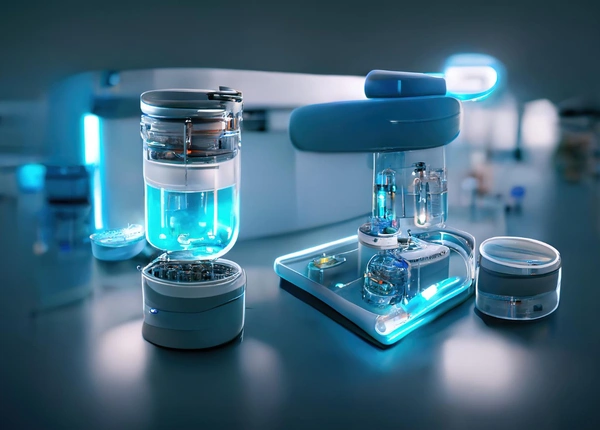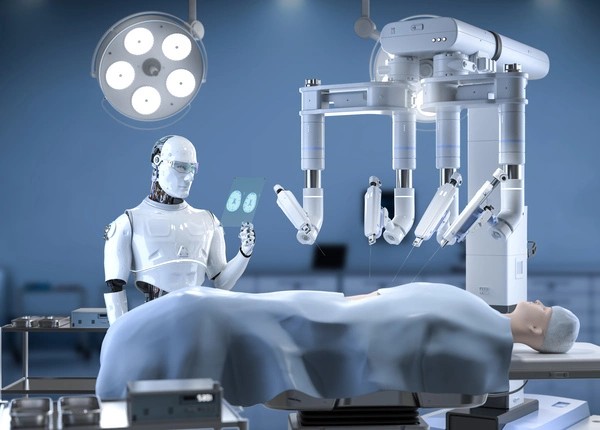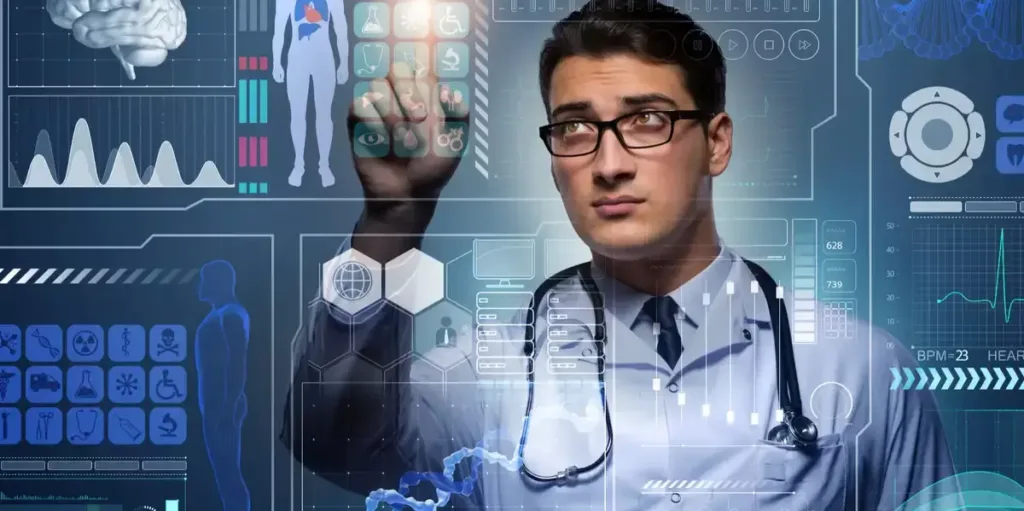Artificial intelligence (AI) has emerged as a game-changer in the healthcare industry, revolutionizing the way we diagnose and treat diseases, develop drugs, and enhance patient care. With the global healthcare market expected to reach nearly $11,909 billion by 2022, AI is poised to play an important role in driving the industry’s growth. Artificial intelligence in healthcare technology management is transforming the way ai healthcare innovations organizations operate and deliver services.
1. Accurate Diagnosis
One of the most significant advantages of AI in healthcare technology management is its ability to provide accurate and efficient diagnoses. Incomplete medical records, inefficient sequencing, and a large number of cases often lead to human errors. However, by feeding medical reports into advanced machine learning algorithms, AI can arrive at the right diagnosis, eliminating mistakes and improving the efficiency of medical facilities significantly.

AI-powered diagnostic tools can analyze medical images, such as X-rays and MRIs, with high accuracy, enabling early detection of diseases and timely intervention.
2. Accelerated Drug Development
Traditional methods of drug development can be prohibitively expensive and time-consuming. However, AI is transforming this process by enabling rapid and cost-effective drug discovery. Artificial intelligence (AI) algorithms can find and forecast promising drug candidates by evaluating huge amounts of data. For example, researchers used AI to study yeast and discovered 19 genes that make yeast, along with nine new and accurate hypotheses.

AI also helped identify triclosan, a common ingredient in toothpaste, as a potential treatment for malaria-based parasites. These advancements have the potential to shorten the drug development timeline and bring life-saving treatments to market faster.
3. Enhanced Patient Experience
In today’s crowded healthcare facilities, patients often face challenges such as long waiting times, confusion around insurance, and difficulties in accessing healthcare providers. AI is addressing these issues by rapidly scanning through data, streamlining processes, and facilitating better patient experiences.

AI-powered solutions enable patients to access healthcare services through mobile devices, providing them with accurate updates on timing, report availability, appointment scheduling, and more. For example, Pulsara, a digital platform, brought essential healthcare technology management communication under one intuitive platform, resulting in improved patient experience and recognition in the form of various innovation awards.
4. Data Security
In the healthcare technology management sector, protecting sensitive patient data is crucial. AI plays a crucial role in ensuring data security by encrypting personal information, clinical reports, diagnostic findings, and more.

AI algorithms help prevent data breaches and securely store information in the cloud, allowing patients and healthcare professionals to access it from anywhere while maintaining privacy and confidentiality.
5. Robot-Assisted Surgery
AI-enabled robots are transforming the field of surgery by enhancing precision, efficiency, and patient outcomes. Equipped with cameras, mechanical arms, and surgical instruments, these robots can perform complex surgeries with minimal invasiveness.

They provide surgeons with a clear, magnified view of the surgical site, surpassing human visual capabilities. Robot-assisted surgeries result in reduced pain, shorter recovery times, and improved surgical outcomes.
6. Remote Monitoring
AI-powered remote monitoring devices are revolutionizing patient care by providing real-time monitoring of critical health events. Connected devices, integrated with Internet of Things (IoT) networks, track and analyze data from the human body. Wearable devices and mobile applications enable patients to access their health data, while AI algorithms facilitate rapid decision-making. This technology has the potential to save lives by enabling early intervention in events such as heart attacks and asthma attacks. The wearable technology market is expected to reach $74 billion by 2026, highlighting the growing demand for remote monitoring solutions.
7. Streamlined Training
AI-based simulations and training platforms are transforming healthcare education and training. These platforms provide healthcare technology management providers with access to vast databases of scenarios, allowing trainees to make decisions and learn from previous responses. By simulating real-life situations, AI facilitates experiential learning, helping healthcare professionals develop the necessary skills and expertise to deliver high-quality care.
8. Risk Prediction
AI algorithms leverage pattern recognition to identify patients’ risk for developing certain diseases. By analyzing vast amounts of patient data, AI can detect early warning signs and provide valuable insights to healthcare providers. This enables timely decisions and actions, leading to improved patient outcomes and preventive care.
9. Smart Health Insurance
AI-powered connected devices are revolutionizing the insurance industry by capturing health data for underwriting and claims operations. This technology provides transparency between insurers and customers, eliminates fraudulent claims, and allows for personalized insurance offerings based on individual health data.

By leveraging AI, insurance companies can make informed decisions, streamline operations, and provide better customer experiences.
10. Location Tracking and Alerts
AI-powered smart medical devices enable real-time tracking, monitoring, and alerting, enhancing patient care delivery. Sensors embedded in devices such as wheelchairs, scales, nebulizers, and pumps allow healthcare staff to track their location and usage. This technology enables hands-on treatments, improves accuracy, facilitates quick intervention by doctors, and enhances overall patient care delivery.
In conclusion, artificial intelligence is revolutionizing the healthcare technology management industry by offering numerous benefits across various aspects of healthcare delivery. From accurate, advanced diagnostics and accelerated drug development to enhanced patient experiences and streamlined training, AI is transforming the way healthcare organizations operate and deliver services. With ongoing research and advancements, AI adoption in healthcare is expected to grow further, leading to even more significant breakthroughs in the coming years. The potential of AI in healthcare technology management providers is vast, and organizations must embrace this technology to create a better and safer world for everyone.
FAQs
What are the key benefits of artificial intelligence in healthcare?
Artificial intelligence (AI) in healthcare offers numerous benefits, including improved diagnosis accuracy, faster drug discovery, personalized treatment plans, automation of administrative tasks, and enhanced patient monitoring.
How are AI healthcare companies improving patient care?
AI healthcare companies use advanced algorithms and machine learning to improve patient care through accurate diagnoses, predictive analytics, and personalized treatment plans. These innovations help healthcare providers offer better, more efficient care.
How does AI improve diagnosis accuracy in healthcare?
AI-powered tools analyze medical data, such as imaging and patient records, to provide more accurate diagnoses. Machine learning algorithms can detect patterns that may be missed by human doctors, leading to earlier and more precise detection of diseases.
Can AI help reduce healthcare costs?
Yes, AI can significantly reduce healthcare costs by streamlining administrative processes, improving efficiency, and minimizing human errors. AI-driven automation also reduces the need for manual tasks, saving both time and resources.
How is AI used in drug discovery and development?
AI accelerates drug discovery by analyzing large datasets to identify potential drug compounds more quickly. AI algorithms can simulate drug interactions, predict outcomes, and help researchers develop new medications faster and at lower costs.
What role does AI play in personalized medicine?
AI enables personalized medicine by analyzing genetic data, patient history, and other health indicators to create customized treatment plans. This approach ensures that patients receive more effective treatments tailored to their unique needs.



